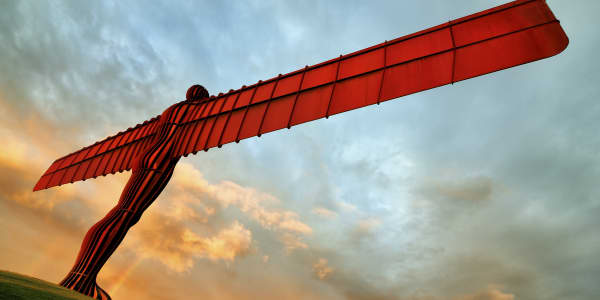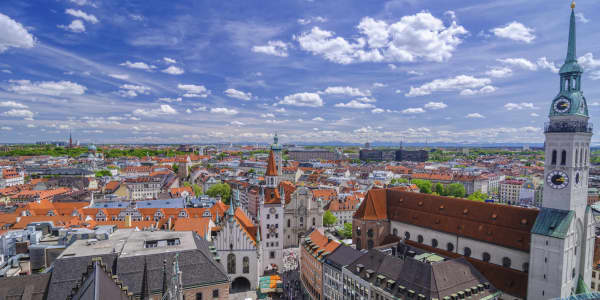Tokyo's titans of innovation
Tokyo is a spellbinding metropolis, with buildings and streets packed with a dazzling array of technology, from toilets that talk to driver-less trains.
Over 13 million people live and work in the city that will host the 2020 Olympics.
Here, CNBC takes a look at eight companies based in the city which have used technology and innovation to entertain, educate and improve our lives.
By Anmar Frangoul, special to CNBC.com
Studio Ghibli:
Founded in 1985 by Isao Takahata, Toshio Suzuki and Hayao Miyazaki (pictured here in 2001), Studio Ghibli has a reputation as one of the world's most innovative, forward-thinking and creative animation studios.
According to the British Film Institute, which recently ran a retrospective of the studio's films, "Ghibli are unafraid to explore important philosophical issues, while never forgetting that their primary role is to entertain".
In 2003, Miyazaki's epic anime fantasy, "Spirited Away", won the Oscar for Best Animated Feature Film, cementing Studio Ghibli's place as one of the planet's leading animation houses.
Sega:
Before home gaming was dominated by Sony and Microsoft, Sega – a company that began in Hawaii as Service Games but moved to Tokyo in 1951 – was a major player in the sector.
Consoles such as the Master System, Genesis and CD-based Saturn were mainstays of many a teenager's bedroom, while characters such as the super-fast Sonic the Hedgehog (pictured) became household names.
Sega stopped making consoles in 2001, but continues to publish popular, critically-acclaimed video games such as the Football Manager series.
Canon:
Founded in Tokyo as the Precision Optical Instruments Laboratory in 1933, the company now known as Canon has developed some of the world's most cutting-edge and iconic cameras, camcorders, copiers and printers.
1959 saw the release of the Reflex Zoom 8, which according to Canon was, "the world's first camcorder with (a) zoom lens."
Seventeen years later, in 1976, the company released the AE-1, which it described as "the world's first camera with an embedded micro-computer", while in 2003, the company launched the CXDI-31, a digital x-ray system that was also portable.
Honda:
Famous for its motorcycles and cars, Honda has also been at the forefront of research and development (R&D) into robotics.
The company has focused on the development of a "two-legged humanoid robot that can walk". In 2000, the ASIMO – Advanced Step in Innovative Mobility – robot was launched.
It is the only humanoid robot in the world capable of walking up and down stairs independently, according to Honda, and the newest version of ASIMO can open a bottle, pour a drink and even use sign language.
Konami:
Founded in Osaka in 1969, and with offices in Tokyo since 1993, Konami revolutionized the 1980s arcade industry with classic video games such as Frogger and Contra.
In 1998, the company released Metal Gear Solid, an immersive, three-dimensional video game that pushed the boundaries of what could be achieved on consoles.
Sony Computer Entertainment:
When the original PlayStation was released in Japan in 1994, the console market was dominated by Nintendo and Sega. Sony Computer Entertainment changed all that with its revolutionary PlayStation console.
Boasting a sleek design, cutting edge 3-D graphics, and games on CDs rather than cartridges, the PlayStation set a new standard for home gaming.
According to Sony Computer Entertainment, the PlayStation was the first console in the history of gaming to sell 100 million units. The PlayStation 4, its latest console, has sold more than 10 million units since its launch last year.
Casio:
In 1957, Casio – originally called Kashio Seisakujo – made waves when it released the world's first compact and entirely electric calculator, the Casio 14-A.
In 1974, the company launched another ground-breaking product, the Casiotron. A computerized electronic wrist watch with a digital display, it allowed users to tell the time accurately in hours, seconds and minutes.
Casio has remained dominant in the digital watch sector ever since, with cutting-edge design and technology at the heart of the company's philosophy.
Seiko:
In 1881, Kintaro Hattori, a 22-year-old businessman, opened a shop in the center of Tokyo that sold and repaired watches and clocks.
Hattori's company designed and built Japan's first wristwatch, the Laurel, in 1913. The company has continued to innovate ever since, launching a number of "world firsts", including the world's first quartz watch.
In 2008, the company announced that it had created the first watch, "designed specifically for a spacewalk". While four years later, the Seiko Astron GPS Solar – a watch that uses GPS technology to adjust to whatever time zone it is in – was launched.




